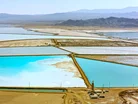Saudi and UAE Oil Companies 'to Produce Lithium for EVs'

National oil companies in Saudi Arabia and the United Arab Emirates are set to extract lithium from brine in their oilfields, as their economies look to profit from the global move to electric vehicles (EVs), Reuters reports.
Saudi Arabia, whose economy for decades has relied on oil, has spent billions on trying to turn itself into a hub for EVs as part of Saudi Crown Prince Mohammed bin Salman's attempts to find alternative sources of wealth.
An unnamed source told Reuters that Saudi Aramco and Abu Dhabi National Oil Company “are in the very early stages of work to extract lithium”. Lithium is seen as a critically important mineral because of its use in the manufacture of batteries, particularly for EVs.
It is not known what form of direct lithium extraction (DLE) technology will be used in the Gulf.
Lithium is a reactive alkali metal and is present as a constituent of salts or other compounds.
DLE is the latest way to extract lithium, and is a technique that involves multiple chemical processes to isolate lithium into a saleable form. There are three three main methods:
- Adsorption Using sorbents to physically adhere to the lithium for selective removal. Sorbents are materials used to absorb oil, and include peat moss, vermiculate, and clay.
- Ion exchange This requires no acid wash or the use of other chemicals, making the method more environmentally friendly.
- Solvent extraction This process involves capturing lithium either chemically or physically and transforming it into a saleable form from brine.
Saudi oil expertise 'will boost lithium production'
DLE technology is in its infancy and its economics are far less certain than those of oil but Saudi Arabia and the UAE can draw on expertise in handling oil brine and wastewater at oil production sites.
An advantage of filtering lithium from salt water is this means there is no need for open pit mines or large evaporation ponds, methods that are used in Australia and Chile – the world’s the world's leading producers of lithium.
The Saudi Arabian Mining Company – the Gulf's largest mining operation – is currently working to extract lithium from seawater.
China is the biggest processor and consumer of lithium, because of its mass production of electric and hybrid vehicles.
Other oil companies, including US-based Exxon Mobil and Occidental Petroleum, are known to be looking to leverage emerging technologies to filter lithium from brine, as the world seeks to move away from fossil fuels.
One issue with extracting lithium from brine is that concentration levels can be very low, making already uncertain economics less favourable.
Although global economic problems have slowed EV sales and caused lithium prices to plummet, the leading carmakers are seeking new lithium supplies in anticipation of future demand.
Analysts say the EV industry is likely to depend on lithium for many years to come, because cheaper battery technologies are yet to reach market maturity.
Saudi Arabia's oil wealth means it can afford to establish itself as a hub for EVs to make use of whatever lithium it produces.
The kingdom has established its own EV brand – Ceer – and has built an EV metals plant. The Kingdom’s sovereign wealth fund, the Public Investment Fund, is set to fund 500,000 EVs annually by 2030.
